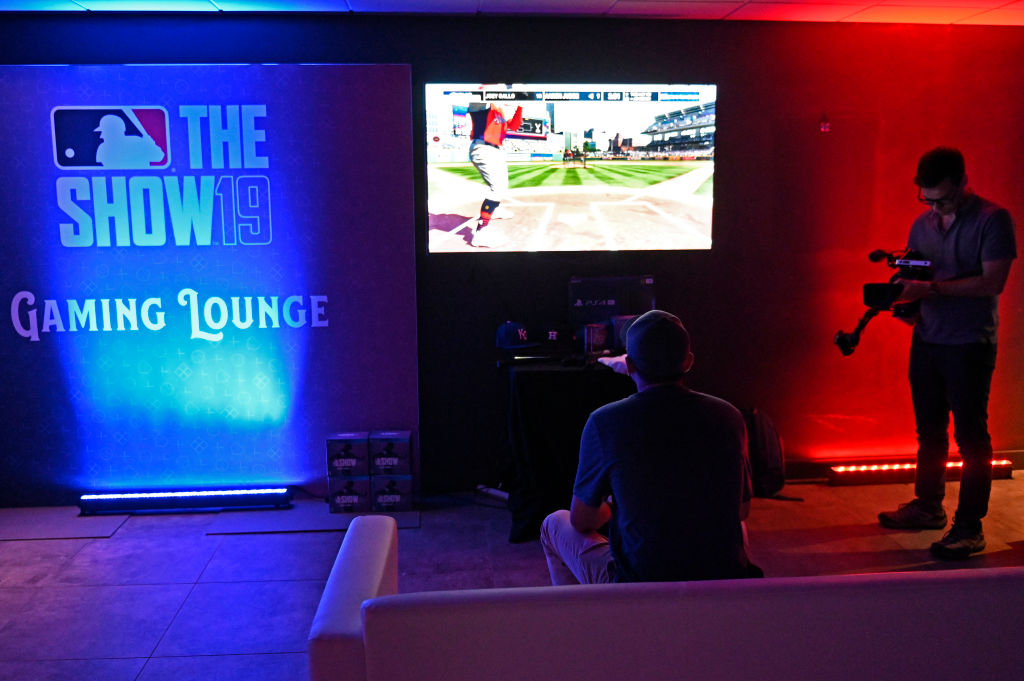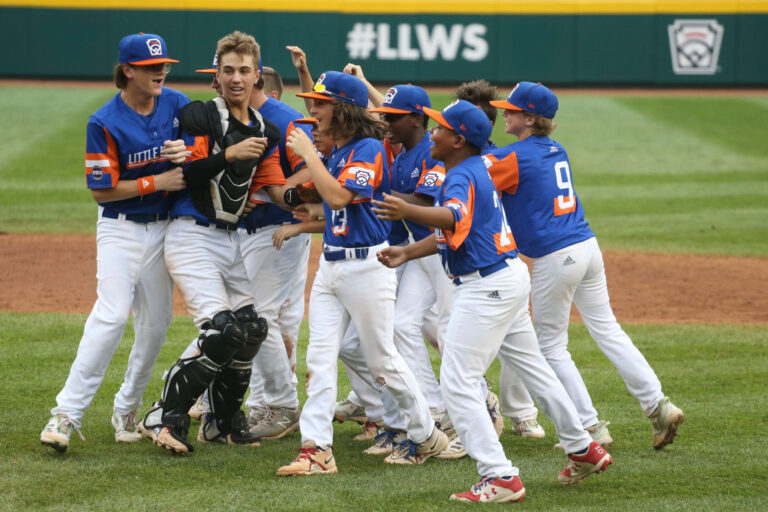Can a More Popular Baseball Video Game Help Actual Baseball Become More Popular?
Why this matters
By almost every metric, American interest in baseball has been declining for decades. Even Major League Baseball’s signature video game franchise, MLB The Show, is far less popular than flagship games for professional football, basketball, and soccer. MLB recently made its game available to more fans, part of what appears to be a push to connect with younger fans and drive year-round engagement with the sport. How much can that help?
If you’re looking for metrics to help illustrate the long-term decline of American interest in baseball, there are many to choose from. Shortly after World War II, nearly four in 10 Americans called baseball their favorite sport; by 2017, that number had fallen to less than one in 10. Television ratings for the World Series, the sport’s marquee showcase, have been sliding for nearly four decades—long before cord-cutting and other forms of digital audience fragmentation came into vogue. At Major League Baseball stadiums, attendance was on the way down prior to the coronavirus pandemic, which has done additional damage.
Then, of course, there are video games.
Professional football, basketball, and soccer sell tens of millions of copies of their flagship games. According to Michael Pachter, an equity research analyst who covers gaming at Wedbush Securities, the FIFA franchise sells 20 to 24 million games a year; the National Basketball Association’s NBA 2K sells 11 to 12 million; and the National Football League’s Madden NFL sells around six million.
By contrast, Pachter estimates that baseball’s MLB The Show, produced by San Diego Studio, sells one to two million. “I think baseball is probably the worst at it,” he says. (The league and its partners don’t release sales data).
This sales gap isn’t just a sign of baseball’s decreasing relevance. It arguably represents a missed marketing opportunity. A popular sports video game can’t single-handedly make its analog inspiration more beloved. But it certainly can help. Leagues have long understood that childhood sports participation lays the emotional groundwork for lifelong fandom; as a NFL executive once told the New Yorker, “It's all about getting a football, this unusual-looking object, into a kid's hands as soon as you can. Six years old, if possible. You want to get a football in their hands before someone puts a basketball in their hands, or a hockey stick or a tennis racquet or a golf club.”
Related: In Esports, the U.S. Still Lags the Rest of the World. Why?
If none of the above is possible, then a game controller can be the next best thing. And beyond acting as gateway drugs, sport titles also can strengthen enthusiasm among existing aficionados. Matt Collins, the managing editor of the SB Nation Boston Red Sox site Over The Monster, has written about how baseball video games expanded his appreciation for the real thing. Though Collins grew up in a family that rooted for the Red Sox, the old MVP Baseball games made him care about more than just his childhood team.
“I wouldn’t say it was the catalyst for my baseball fandom, just because my whole family is all sports fans, so it was kind of inevitable,” he says. “But it made me much more interested, I think, in the league as a whole––rather than just the Red Sox.”
In an entertainment era defined by digital, on-demand abundance—more choices for viewers, more competition for eyeballs—sports video games fulfill another important function. They keep people thinking about sports when those sports aren’t being played. The MLB season ends by November. The league lacks a tentpole offseason event comparable to the NFL Draft, and spring training won’t begin until next March. Something like MLB The Show can help fill the void.
“It’s the same goal for baseball or for football that it is for Batman, and that it is for Spider-Man, and that it is for ‘Star Wars,’ that is for ‘Lord of the Rings,’” Pachter says. “They want to keep people engaged and interested in the brand when there’s no movie content for the brand. And so for the sport leagues, they want to keep you interested in the brand when there’s no live content, just to make sure that you’re engaged and interacting and paying attention.”
This seems to be MLB’s goal. “Anything that we can do to to make a fan’s experience with baseball brighter, stronger, deeper, or richer is something that’s gonna be left with them for their whole lives and for the lives of anybody that they touch,” the league’s senior vice president for games and VR, Jamie Leece, said in a video MLB released at the end of September. “So when you think about, ‘What is our primary goal here?,’ it’s about driving engagement –– and when we drive engagement, to increase that engagement and to amplify engagement. Video games are a great way of doing that.”
Historically, baseball games have lacked both the sales numbers and pop culture cachet of titles like Madden NFL and NBA 2K. It’s unclear whether MLB considers that a problem, but one recent change offers a clue: Prior to this year, MLB The Show, which is made by Sony, was only available on the company’s PlayStation consoles. It is now playable on rival Microsoft’s Xbox consoles as well, something that almost certainly would not have happened without cooperation from MLB and its players association.
“Even if you were to say, ‘Gosh, 20 percent of the people who buy baseball started watching it or going to games,’ then great: 200,000. It’s just not a number that’s going to move the needle. So I don’t think it’s a big deal.” - Michael Pachter, Wedbush Securities
While exact numbers are not publicly available, sales of MLB The Show have been stronger than ever. Mat Piscatella, the executive director for games at industry researcher The NPD Group, says this year’s version of the title is “already the best-selling baseball game in U.S. history” by dollar sales. Piscatella also says that gamers playing MLB The Show via Xbox’s Game Pass subscription service—think Netflix, but for games—are not included in that figure. Pachter estimates a few million more players could be playing the game through that way. “If it’s part of Game Pass, then that’s really good. That means Microsoft’s paying up for it,” he says. Game Pass had 18 million subscribers as of January 2021. And whatever Microsoft is paying is only part of the benefit for MLB, which gets to reach more people who might decide they like baseball. “If you can create a stronger relationship, then the business side of things is easy, and you’ve actually created an evangelist for your product,” Leece said, “and you’ve created a moment that will go beyond the transactional.”
As many sports leagues struggle to connect with Generation Z, MLB lately seems to have focused on simply not alienating fans—especially younger ones—who could be leery of stuffy traditions like the game’s infamous Unwritten Rules. Having an accessible video game fits into that strategy: why close yourself off to a kid who wants to play as MLB The Show cover athlete Fernando Tatis Jr. on Xbox? So does marketing the sport itself as a place where boisterous expression and showmanship are welcome. MLB has made youthful exuberance a central part of recent marketing campaigns, including the “We Play Loud” effort it unveiled in 2019. The league’s Twitter and TikTok accounts are loaded with highlights of bat flips, staredowns, and other shows of emotion that used to be not just taboo, but also frequent cause for someone to have a fastball thrown at them.
In August, MLB staged a “Field of Dreams” game in Dyersville, Iowa between the New York Yankees and Chicago White Sox that became a ratings bonanza. While building a 8,000-seat ballpark near the site of the syrupy 1989 movie may not seem to have much in common with expanding console access to a video game, both moves come from the same place: The most powerful people in baseball have realized they need to give more people more occasions to do anything that engages with the sport.
Related: Collegiate Esports: Much More Than A Game
For his part, Pachter doesn’t think that a single video game can spur significantly increased interest in baseball. The math, he says, just doesn’t add up. Suppose that this year’s edition of MLB The Show sells a million copies––probably a little low, but in line with the game’s previous performance. “Even if you were to say, ‘Gosh, 20 percent of the people who buy baseball started watching it or going to games,’ then great: 200,000,” Pachter says. "It’s just not a number that’s going to move the needle. So I don’t think it’s a big deal.”
It’s also difficult to see how video games can help rekindle Black America’s connection to the sport, which from youth baseball to the major leagues has spent decades making itself harder and less appealing for Black people to play and love. MLB seems to understand this problem—or is at least paying lip service to it by making a nine-figure investment to increase Black representation in concert with the Players Alliance, a group of 150 current and former players that seeks to make the sport more equitable. MLB The Show arguably has the potential to introduce more children of Color to the game, and make the sport seem a bit more welcoming and exciting to gamers of all races and ages. But it can’t make up for a lack of accessible youth baseball playing options, or for major league rosters that are only seven percent Black.
A popular video game can only do so much. Even if MLB The Show sold 15 million copies next year, baseball wouldn’t surpass football as the country’s chief athletic obsession. However, that’s also not the point. Games like Madden NFL and NBA 2K may not be transformative, but they are additive—the same way bat flips and made-for-TV games near famous cornfields are. They make some people care who otherwise wouldn’t, and give people who already care more chances to feel connected. Never mind home runs: faced with declining interest, MLB needs all the singles it can hit. MLB The Show may still trail its sports gaming peers in popularity, but the good news for baseball is that it’s trending in the right direction.
Monthly Issue
Rediscovering America's Pastime
For baseball to survive as America’s pastime, the sport known for tradition and nostalgia will need to broaden its appeal across racial, cultural, and gender lines.
For the kid who swings a bat for the first time; the front office data analyst looking for the next big star; the minor leaguer hoping to make it to the bigs; and the major league manager looking to stay on top, can a centuries-old sport become more diverse and inclusive in new ways?




